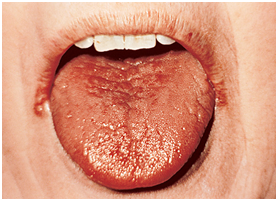Xerostomia Causes, Symptoms, Diagnosis and Treatment

What is Xerostomia?
Xerostomia (dry mouth) can be a side effect of medication. It is also caused by irradiation of the head and neck area or by damage or disease of the salivary glands. Patients with a persistent dry mouth can develop a burning or scalded sensation and have poor oral hygiene. They are prone to increased tooth caries, periodontal disease, oral infections (particularly candidiasis) and intolerance of prostheses. If possible, the treatment is directed to the underlying cause of the dry mouth. If this is not possible or is only partially successful, symptomatic treatment is used.
Causes of Xerostomia
- Medications – many prescription and OTC (over-the-counter, no prescription required) medications cause dry mouth, including antihistamines, hypertensive medications , anti-diarrheals, muscle relaxants, urinary continence drugs, some medications
- Age
- Cancer treatment
1. radiotherapy
2. chemotherapy
- Injury or surgery – which results in nerve damage to the head and neck area, can result in dry mouth.
- Tobacco
- Dehydration
- Exercising or playing in the heat –
Some health conditions, illnesses and habits – such as:
- Anxiety disorders
- Depression
- AIDS
- Parkinson’s disease
- Poorly controlled diabetes
- Sjogren’s Syndrome
- Sleeping with the mouth open
- Snoring
- Stroke
Symptoms of Xerostomia
- Dryness in your mouth or throat
- Saliva that seems thick and stringy
- Bad breath
- Difficulty chewing, speaking and swallowing
- A changed sense of taste
- Problems wearing dentures
- More frequent tooth decay
- Gum irritation and gum disease
In addition, dry mouth may result in lipstick sticking to the teeth.
Diagnosis of Xerostomia
To determine if you have dry mouth, your doctor or dentist will probably check your mouth and check your medical history and all medications you are taking, including over-the-counter medicines.
Sometimes you may need to identify blood tests, imaging scans of your salivary glands, or tests that measure how much saliva you are producing to identify the cause of your dry mouth. If your doctor suspects that your dry mouth is caused by Sjögren’s syndrome, a small sample of cells (biopsy) taken from salivary glands in your lip can be sent for testing
Treatment of Xerostomia
- Medications – if the dry mouth is thought to be caused by a medication, the doctor will either alter the dosage or prescribe another drug which is less likely to cause dry mouth.
- Stimulating saliva production – a medication, such as
i.pilocarpine (Salagen)
ii.cevimeline (Evoxac)
- Special attention to oral/dental hygiene. This includes
a.plaque removal
b.treatment of gingival infections, inflammation and dental caries.
c.Brushing teeth and flossing regularly
- Sipping fluids (non-carbonated, sugarless), chewing xylitol-containing gum, and using a carboxymethyl cellulose saliva substitute as a mouthwash may help.
- The patient should not wear dentures during sleep. The dentures must be kept clean by overnight soaking.
- Alcohol consumption should be kept to a minimum or avoided altogether.
- Caffeine consumption should be kept to a minimum.
- Chewing or smoking tobacco should be avoided.
- Eating such foods as carrots or celery may help with residual salivary gland function.
- Breathing through the nose does not dry the mouth, while breathing through the mouth does.
- Humidity – a humidifier can add moisture to a bedroom. This may help reduce dry mouth symptoms that develop during sleep.
By : Natural Health News




